
2022 is a very difficult year for the semiconductor industry, the consumer electronics chip market continues to be sluggish, the memory chip market is close to freezing, and many semiconductor companies have been affected to varying degrees. So far, this situation has not improved significantly, and the bottoming rebound has not yet arrived. However, there are exceptions, STMicroelectronics, Infineon, NXP, as the three giants in the European semiconductor field, because they have seized the fastest-growing and most stable market demand in 2022, the automotive and industrial fields. Under such a volatile market environment, the three companies have been minimally affected and have achieved good growth.
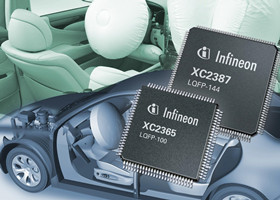
Leading the automotive chip market
At present, the hottest semiconductor market is the automotive market. In recent years, the automotive industry has developed rapidly, the pace of "new four modernizations" (electrification, networking, intelligence, sharing) is getting faster and faster, especially the speed of electric vehicles has exceeded previous expectations, it is expected that by 2030, the degree of electrification in cars will reach at least 60%, and more and more chips are required in cars. The cost of semiconductor devices in a traditional car is about $500. However, the cost of semiconductor devices in a software-defined electric vehicle is estimated at $1500~2000, which is 3~4 times that of traditional cars.
Therefore, more and more chip manufacturers have begun to transform to automotive chips, but the safety, stability and matching degree of automotive chips required by automotive-grade chips require a long time of research and development, testing and on-board experiments. And whether it is from the original production line to the production line of automotive-grade chips, or the new production line requires time and money, which makes many companies sigh at the automotive market.

And this makes the three European giants, which have been deeply engaged in automotive chips, win at the starting line. Complete technology, mature products, sufficient production capacity, coupled with a solid customer circle that has been established for a long time, the three giants have achieved the first place in their respective segments. In the list of the top ten manufacturers in the automotive semiconductor business in 2021 released by Semiconductor Intelligence, Infineon ranked first, NXP second, and STMicroelectronics fifth; In the field of power semiconductors, Omdia announced that among the top ten manufacturers in the power semiconductor market in 2021, Infineon ranked first and STMicroelectronics ranked third; In the SiC market, STMicroelectronics ranked first and Infineon second; In the MCU field, according to the ranking of the world's top ten MCU manufacturers in 2021 published by IC Insights, NXP, STMicroelectronics, and Infineon are among the top five, with a combined market share of 47.3%. This also makes the position of the Big Three in the field of automotive chips extremely solid.
Jean-Marc Chery, President and CEO of STMicroelectronics, said: "ST's full-year 2022 revenue grew 26.4% to $16.13 billion, driven by strong demand in the automotive and industrial markets. Operating margin increased to 27.5% from 19.0% last year, and net profit doubled to $3.96 billion. The revenue target for the whole year of 2023 is 16.8 billion ~ 17.8 billion US dollars. ”
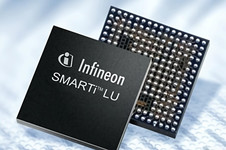
It is understood that the Automotive and Discrete Products Group (ADG) contributed more than 30% of ST's total revenue in 2022. The automotive business is at the heart of ST's $20 billion revenue target.
Jean-Marc Chery said that ST has reached cooperation with 20 automotive companies, and more than 100 projects are underway with industrial and automotive customers. Silicon carbide vehicle enterprise customers include BYD, Geely, Great Wall, Hyundai, Xpeng, etc. Tier 1 supplier customers include Delta, Huawei, Huichuan, Xinrui Technology, Sungrow, Wemax New Energy, etc. Asian customers contribute approximately 30% of ST's SiC revenue. It is expected to achieve a revenue target of $1 billion in silicon carbide in 2023.
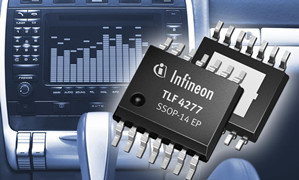
Infineon's previously released financial report for the first quarter of fiscal 2023 showed that it achieved revenue of 3.951 billion euros and net profit of 1.107 billion euros, an increase of 4.6% sequentially. According to Infineon, decarbonization and digitalization will drive strong structural demand for semiconductors, which will drive sustainable business growth for Infineon. As a result, Infineon has raised its long-term financial targets, expecting revenues of €3.9 billion in the second quarter of fiscal 2023 and total revenue of around €15.5 billion in fiscal 2023, a growth rate of around 10 percent.
Jochen Hanebeck, CEO of Infineon, said: "Even in the weak macroeconomic environment, most of Infineon's businesses performed strongly. In particular, the energy transition and the expansion of electromobility have led to a continuous high demand for solutions in industrial and automotive applications. ”
NXP's financial report for the fourth quarter of 2022 showed that revenue was $3.312 billion, a year-on-year increase of 9%, exceeding market expectations; Net income was $734 million, up 20% year-over-year. Among them, the revenue of automotive chips increased by 17% year-on-year to US$1.805 billion, and the proportion of revenue rose to 54.5%. NXP's full-year 2022 revenue was $13.21 billion, up 19.4% year-over-year; Net income was US$2,833 million, up 48.6% year-over-year. Kurt Sievers, President and CEO of NXP, said that NXP had a good year in 2022, with new revenue and good performance in the automotive business.
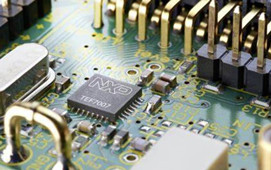
Tingwei Li, chairman of NXP Greater China, told reporters that the continuous growth of electric vehicle sales has accelerated the demand for in-vehicle products, and OEMs give priority to high-end products when production capacity is limited, so NXP's automotive business has a good performance. In 2023, NXP will continue to invest, deploy and protect R&D investments, while continuing to drive accelerated growth in areas such as automotive and core industries. In addition, the increasing level of global production and the increasing popularity of electric vehicles will drive the demand for semiconductor products to continue to grow. Combined with the trend of upgrading from 24GHz radar to 77GHz, NXP believes that 77GHz radar is one of the driving forces for NXP's accelerated growth.
Expansion of 12-inch wafers and wide bandgaps
In 2023, the automotive and industrial industries will still be the main growth points of the semiconductor market, IDC Asia-Pacific research director Guo Junli said that the semiconductor market shows the characteristics of structural adjustment, and it is expected that the growth rate of automotive chips will be about 38%, and the growth rate of industrial chips will be about 28%. Major automotive chip manufacturers are asking wafer fabs to increase wafer production, and shouting out the promise of "how much production capacity can be collected", and cooperation with silicon carbide manufacturers is getting closer. In the face of huge orders, the three giants have taken production expansion as their top priority.
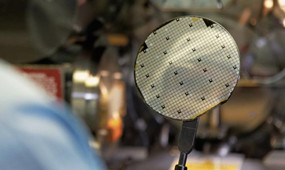
According to ST, automotive will be one of the main drivers of ST's growth in the coming years. As a result, investments will be made to enrich automotive technology nodes and increase SiC manufacturing capabilities, which are fundamental to ST's market goals.
ST has two expansion priorities, one is the 12-inch fab, which currently produces wafers mainly in Crolles, France, and Agrate, Italy, and plans to double its 12-inch capacity by 2025. ST is also working with GF to build a new 12-inch semiconductor manufacturing facility near ST's existing 12-inch facility in Kroll, France, to support a variety of chip manufacturing technologies. ST is the first company to "put silicon carbide power devices on board", and is a major player in the current silicon carbide power device market, with its Catania plant in Italy and Singapore already producing silicon carbide products. They will also establish an integrated silicon carbide substrate manufacturing plant in Catania, Italy, to meet previously growing market demand. In 2023, ST's capital expenditures are expected to be approximately $4.00 billion, primarily to increase 12-inch wafer capacity and SiC chip and substrate capacity.
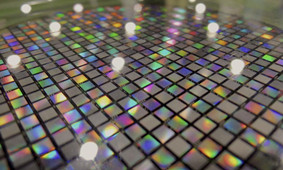
ST believes that wide bandgap semiconductor technology is the key to improving energy efficiency and promoting the adoption of electric vehicles. ST is accelerating its investment in SiC capacity, aiming to achieve more than 2.5 times the 2020 level in 2022 and sourcing 40% of its substrates in-house by 2024. In addition, they are increasing silicon carbide back-end production capacity and investing in the expansion of packaging and testing plants in Bouskoura, Morocco, and Shenzhen, China. In terms of gallium nitride, its Tours plant in France has now completed the construction of an 8-inch production line and an epitaxial manufacturing center, and is expected to start mass production this year. At the same time, PowerGaN products manufactured by TSMC are already in production. In terms of IGBT and silicon MOS technology, the production of 12-inch power wafers at the new plant in Agrate, Italy, is being accelerated.
Infineon said that markets driven by structural factors, such as automotive and industrial applications, are showing strong momentum. In 2023, China's auto market will also continue the growth trend of the previous year. The development process on the road of low-carbon and digitalization continues to accelerate, the penetration rate of new energy vehicles will continue to increase, and the market for autonomous driving passenger cars at level 2 and above will grow rapidly. In addition, the differentiation of user experience will also drive the development of intelligent cockpits. The future growth driver of the automotive sector will continue to be transformed and developed from low-carbon and digitalization, from electric mobility, autonomous driving, to intelligent networking, China's automotive market will continue to make efforts in the core direction.
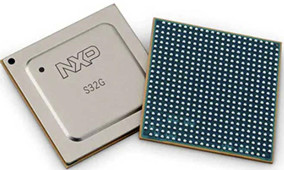
The relevant person in charge of Infineon told the "China Electronics News" reporter that silicon carbide and gallium nitride technology are becoming more and more important, and Infineon will further expand production capacity. The investment of more than EUR 2 billion at the Kulim plant in Malaysia sets the course for Infineon to meet long-term demand growth. In addition, we continue to expand cooperation with silicon carbide suppliers, and have signed supply agreements with four silicon carbide suppliers, and are preparing other agreements.
In GaN technology, Infineon acquired GaN Systems, a GaN power semiconductor manufacturer, for $830 million to strengthen its GaN portfolio and further strengthen Infineon's position in power systems.
Infineon also plans to continue expanding its 12-inch wafer fabrication capabilities to meet the expected accelerated growth in analog/mixed-signal and power semiconductors. The new plant is planned to be located in Dresden, Germany, with a total investment of 5 billion euros, the largest single investment in Infineon's history. The company has signed a long-term strategic cooperation agreement with wafer fab UMC for automotive-grade MCUs to increase Infineon's production capacity for automotive MCUs and further expand its position in automotive chips. It is understood that the high-performance automotive-grade MCU products will be produced at the Singapore fab of UMC's subsidiary and manufactured using the 40nm process. In addition, Infineon purchased a building to double the production space at its Batam plant in Indonesia. The expansion aims to refocus the Batam plant on packaging and testing automotive chips.

Li Tingwei pointed out that while the semiconductor industry will enter a very different and challenging market environment in 2023, NXP will continue to focus on markets dominated by automotive and industrial businesses. In the medium term, NXP is cautiously optimistic given the level of customer engagement and design adoption momentum in strategic focus areas.
Very optimistic about the Chinese market
In terms of future development strategies, the three companies have strengthened cooperation with Chinese enterprises and expressed great importance to the Chinese market.
At the end of 2022, Jean-Marc Chery, President and CEO of STMicroelectronics and Jerome Roux, President of Global Marketing, led the company's management team to China and visited a number of Chinese strategic partners, including Changan Automobile, Cialis Automobile, CATL, Goodway, Wemax New Energy Solution, and Etek Automotive Electronics. Jean-Marc Chery is also the first global semiconductor CEO to visit China in the past three years. Zhiping Cao, Executive Vice President and President of STMicroelectronics China, said: "China is one of ST's most important strategic markets. Jean-Marc's visit to Chinese customers underscores ST's commitment to the Chinese market and confidence in the fast-growing Chinese automotive and industrial markets.
According to the relevant person in charge of Infineon Greater China, in terms of building a local ecosystem, Infineon Greater China has continued to make efforts in three aspects: improving local application capabilities, continuously strengthening the ability to add value to customers, and building a digital ecological community, with remarkable results.
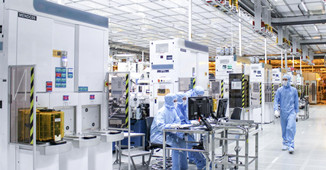
From an application innovation perspective, Infineon and its partners have created many new applications. For example, in the first half of 2022, Infineon's Power & Sensing Systems Business Unit cooperated with the Automotive Electronics Business Unit to develop the world's first 60-watt in-car fast charging + cross-terminal interactive entertainment system based on USB-C/PD and successfully commercialized a new SUV based on its own accumulation of USB system technology, cooperating with Tier 1 suppliers and leading domestic automakers.
NXP China announced further in-depth cooperation with Great Wall Motor, NIO, Xpeng Motors, and CAIC Chuangzhi, Li Tingwei said that China's increasing proportion of NXP's global revenue shows NXP's outstanding results in China for many years. NXP has been deeply engaged in China for more than 30 years, and in the future, NXP will continue to help Chinese automotive companies accelerate innovation through leading technical advantages, deep industry accumulation, global vision and localized support


